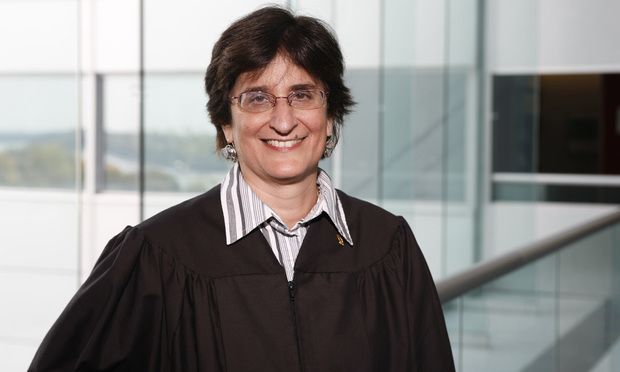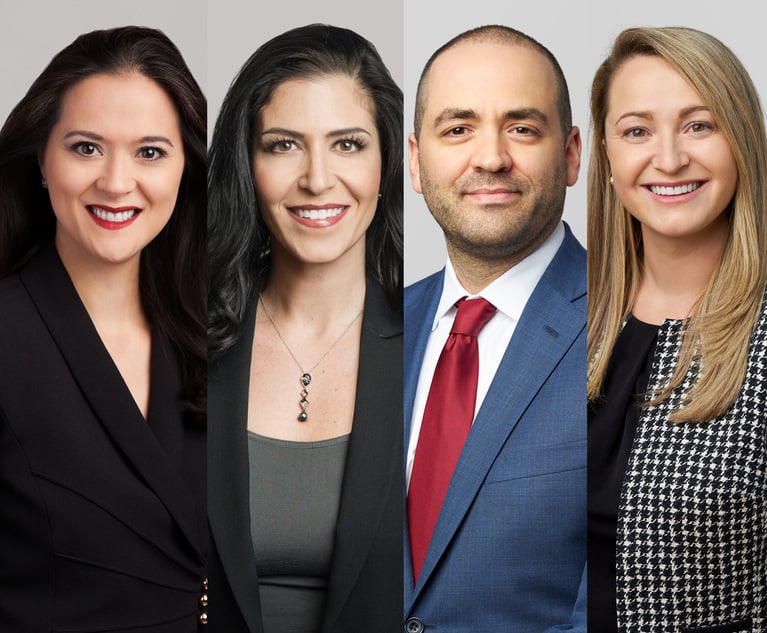Judges OK Medicaid Benefits for Immigrant Who Left, Then Returned
A New Jersey appeals court ruled Wednesday that a legal immigrant, who temporarily returned to his native country and then came back to New Jersey, may still be entitled to Medicaid benefits.
February 14, 2018 at 05:06 PM
3 minute read
 Judge Ellen Koblitz.
Judge Ellen Koblitz. A New Jersey appeals court ruled Wednesday that a legal immigrant, who temporarily returned to his native country and then came back to New Jersey, may still be entitled to Medicaid benefits.
A three-judge Appellate Division panel in a published decision Tuesday said the petitioner, identified only as K.K., is qualified to receive benefits because of the length of time he lived in the United States before he temporarily left for his native country, India.
Because K.K. had lived so long in the United States, and had already qualified for benefits, those benefits should not be revoked, said Appellate Division Judges Jose Fuentes, Ellen Koblitz and Thomas Manahan.
“A lapse in continuous presence is … permitted, so long as an individual has already obtained qualified alien status,” Koblitz wrote for the panel.
The court referred to the Personal Responsibility and Work Opportunity Reconciliation Act of 1996, which “was enacted by Congress to continue the federal immigration policy of promoting self-sufficiency and self-reliance of immigrants to reduce the burden on public benefits,” and led to amendments to Medicaid law.
K.K.'s “absence from the country for seven years after reaching the age of 65 relieved the government of making Medicaid payments during that time, thus safeguarding the taxpayer's resources,” the panel said. “In light of federal immigration policy intended to reduce the burden on public benefits, such absences need not be discouraged.”
K.K., now 88, immigrated to the United States in 1991 and became a legalized permanent resident. He eventually began receiving $226 a month in Social Security benefits, the ruling said.
K.K. returned to India in 2007, returning to the United States in 2014. A year later, he applied for Medicaid benefits.
The state Department of Human Services denied his claim, saying that under the state Medical Assistance and Health Services Act, he was not qualified to receive benefits because he was not a permanent resident for at least five years. The agency considered his entry date to be 2014, when he returned from the stay in India, not 1991, when he first entered the United States.
K.K. appealed, contending that the law entitled him to benefits since he had been a legal permanent resident before 1996, and the Appellate Division agreed “based on the plain wording of the Medicaid eligibility statute, N.J.S.A. 30:4D-3(q)(1)(a).”
K.K.'s lawyer, Somerville solo Kevin Kovacs, said only that the appeals court correctly applied regulations governing the granting of benefits.
The Attorney General's Office, which represented the DHS, did not respond to a request for comment.
This content has been archived. It is available through our partners, LexisNexis® and Bloomberg Law.
To view this content, please continue to their sites.
Not a Lexis Subscriber?
Subscribe Now
Not a Bloomberg Law Subscriber?
Subscribe Now
NOT FOR REPRINT
© 2025 ALM Global, LLC, All Rights Reserved. Request academic re-use from www.copyright.com. All other uses, submit a request to [email protected]. For more information visit Asset & Logo Licensing.
You Might Like
View All
On the Move and After Hours: Einhorn Barbarito; Gibbons; Greenbaum Rowe; Pro Bono Partnership
4 minute read

Engine Manufacturer Escapes Suit Over NJ Helicopter Crash That Killed Country Music Star
3 minute readTrending Stories
- 1States Accuse Trump of Thwarting Court's Funding Restoration Order
- 2Microsoft Becomes Latest Tech Company to Face Claims of Stealing Marketing Commissions From Influencers
- 3Coral Gables Attorney Busted for Stalking Lawyer
- 4Trump's DOJ Delays Releasing Jan. 6 FBI Agents List Under Consent Order
- 5Securities Report Says That 2024 Settlements Passed a Total of $5.2B
Who Got The Work
J. Brugh Lower of Gibbons has entered an appearance for industrial equipment supplier Devco Corporation in a pending trademark infringement lawsuit. The suit, accusing the defendant of selling knock-off Graco products, was filed Dec. 18 in New Jersey District Court by Rivkin Radler on behalf of Graco Inc. and Graco Minnesota. The case, assigned to U.S. District Judge Zahid N. Quraishi, is 3:24-cv-11294, Graco Inc. et al v. Devco Corporation.
Who Got The Work
Rebecca Maller-Stein and Kent A. Yalowitz of Arnold & Porter Kaye Scholer have entered their appearances for Hanaco Venture Capital and its executives, Lior Prosor and David Frankel, in a pending securities lawsuit. The action, filed on Dec. 24 in New York Southern District Court by Zell, Aron & Co. on behalf of Goldeneye Advisors, accuses the defendants of negligently and fraudulently managing the plaintiff's $1 million investment. The case, assigned to U.S. District Judge Vernon S. Broderick, is 1:24-cv-09918, Goldeneye Advisors, LLC v. Hanaco Venture Capital, Ltd. et al.
Who Got The Work
Attorneys from A&O Shearman has stepped in as defense counsel for Toronto-Dominion Bank and other defendants in a pending securities class action. The suit, filed Dec. 11 in New York Southern District Court by Bleichmar Fonti & Auld, accuses the defendants of concealing the bank's 'pervasive' deficiencies in regards to its compliance with the Bank Secrecy Act and the quality of its anti-money laundering controls. The case, assigned to U.S. District Judge Arun Subramanian, is 1:24-cv-09445, Gonzalez v. The Toronto-Dominion Bank et al.
Who Got The Work
Crown Castle International, a Pennsylvania company providing shared communications infrastructure, has turned to Luke D. Wolf of Gordon Rees Scully Mansukhani to fend off a pending breach-of-contract lawsuit. The court action, filed Nov. 25 in Michigan Eastern District Court by Hooper Hathaway PC on behalf of The Town Residences LLC, accuses Crown Castle of failing to transfer approximately $30,000 in utility payments from T-Mobile in breach of a roof-top lease and assignment agreement. The case, assigned to U.S. District Judge Susan K. Declercq, is 2:24-cv-13131, The Town Residences LLC v. T-Mobile US, Inc. et al.
Who Got The Work
Wilfred P. Coronato and Daniel M. Schwartz of McCarter & English have stepped in as defense counsel to Electrolux Home Products Inc. in a pending product liability lawsuit. The court action, filed Nov. 26 in New York Eastern District Court by Poulos Lopiccolo PC and Nagel Rice LLP on behalf of David Stern, alleges that the defendant's refrigerators’ drawers and shelving repeatedly break and fall apart within months after purchase. The case, assigned to U.S. District Judge Joan M. Azrack, is 2:24-cv-08204, Stern v. Electrolux Home Products, Inc.
Featured Firms
Law Offices of Gary Martin Hays & Associates, P.C.
(470) 294-1674
Law Offices of Mark E. Salomone
(857) 444-6468
Smith & Hassler
(713) 739-1250







